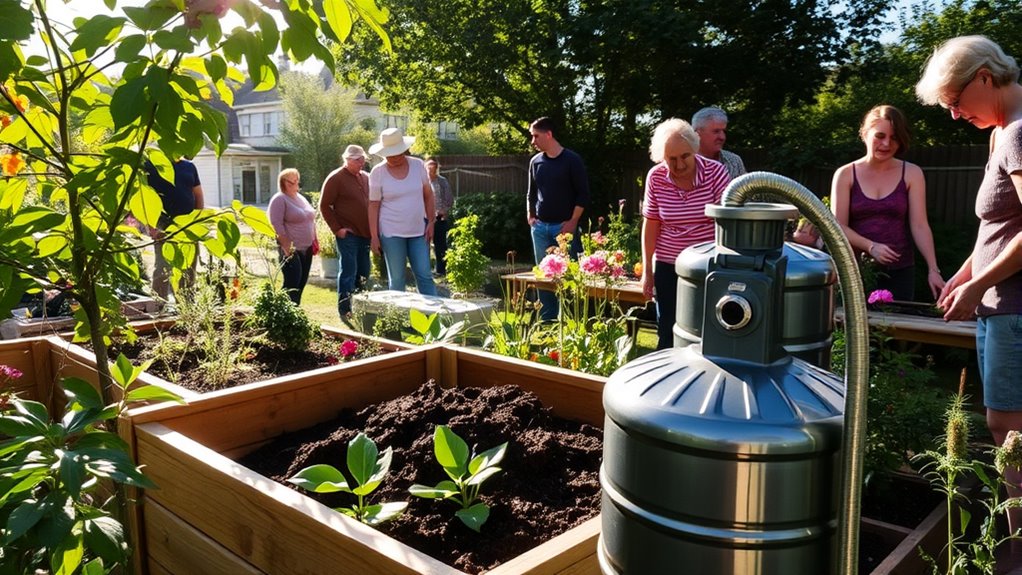Sustainability means meeting today’s needs without jeopardizing future generations. It balances social equity, economic growth, and environmental health. By adopting sustainable practices, you can reduce your carbon footprint, support local communities, and contribute to a healthier planet. Engaging in eco-friendly habits, like choosing renewable energy or reducing waste, empowers you and those around you. If you want to explore how you can make a real impact, there’s more to discover about the various aspects of sustainability.
Key Takeaways
- Sustainability involves maintaining processes over time without compromising future generations’ needs, aligning human activities with Earth’s natural cycles.
- It encompasses three pillars: social, economic, and environmental sustainability, each crucial for a balanced approach to development.
- Social sustainability focuses on equity, access to resources, and community engagement, fostering inclusiveness and resilience.
- Economic sustainability aims for long-term growth while ensuring social and environmental well-being, enhancing efficiency and brand reputation.
- Environmental sustainability is about conserving natural resources, protecting ecosystems, and mitigating climate change impacts for a healthier planet.
Understanding Sustainability: Definition and Importance

Sustainability is more than just a buzzword; it’s a crucial concept that shapes our future. It means maintaining processes over time without compromising future generations’ needs. Understanding sustainability is essential because it aligns your activities with Earth’s natural cycles, preventing potential human extinction. Additionally, adopting eco-friendly accommodations promotes responsible tourism practices that contribute to sustainability. Moreover, investing in renewable energy solutions like solar and wind can significantly reduce our carbon footprint while providing long-term economic benefits. For instance, using battery-less solar inverters can help homeowners utilize solar energy immediately without the need for expensive battery systems.
Since the Brundtland Commission’s 1987 report, the importance of sustainable development has gained global recognition. By adopting sustainable practices, you can contribute to long-term economic stability and social equity, conserving resources and reducing inequality. Additionally, prioritizing economic sustainability ensures that we conserve natural resources for future production and success.
Moreover, focusing on sustainability helps preserve vital natural resources like clean air and water for those who come after us. Embracing this concept allows you to make a meaningful impact on both the environment and society.
The Three Pillars of Sustainability
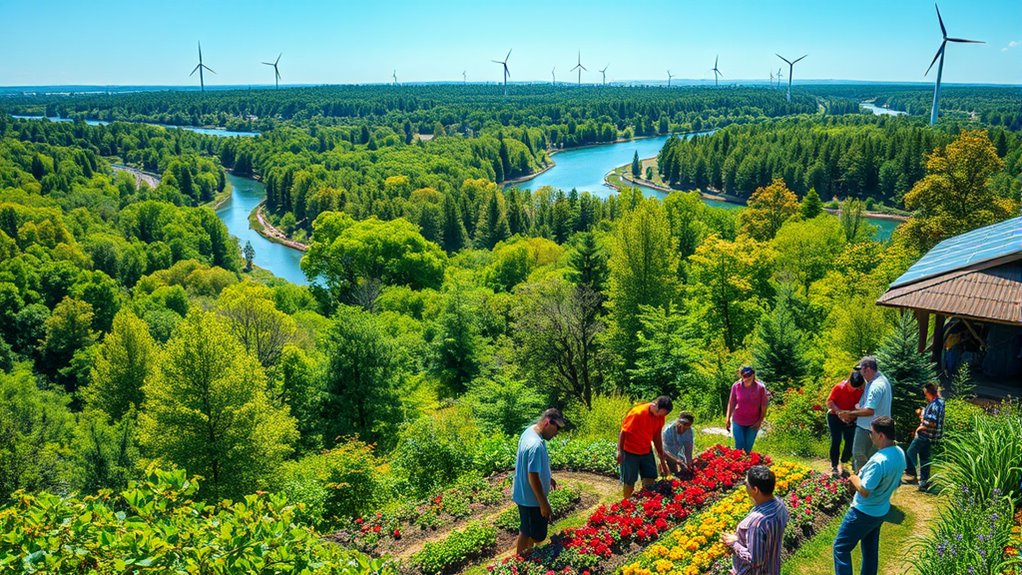
At the heart of sustainable development lie three interconnected pillars: social, economic, and environmental sustainability.
Social sustainability focuses on equitable practices, ensuring everyone has access to basic needs like education and health. It’s about building strong communities and promoting employee well-being. People, planet, and profit must be balanced to foster a thriving society.
Economic sustainability aims for long-term growth without harming social or environmental systems, encouraging practices like recycling and renewable energy use. This ensures resources remain available for future generations while balancing profit with ethical concerns.
Lastly, environmental sustainability emphasizes protecting ecosystems and reducing pollution.
Each pillar influences the others, making it essential to consider them together. By integrating these pillars into daily practices, you contribute to a healthier, more sustainable world for yourself and future generations.
Environmental Sustainability: Protecting Our Planet

While we often take the planet’s resources for granted, protecting our environment is crucial for our survival and the well-being of future generations.
Environmental sustainability means maintaining ecological balance and conserving natural resources. It’s essential for protecting ecosystems, tackling climate change, and ensuring biodiversity. Currently, 2.2 billion people lack access to safe water globally, which emphasizes the pressing need for responsible resource management. Air purifiers can also play a significant role in improving indoor air quality, which is vital for health and well-being. Implementing systems like geothermal heat pumps can significantly reduce greenhouse gas emissions and promote energy efficiency. Heat pumps can also reduce energy bills by up to 50%, making them a financially viable option for many households.
When the environment suffers, communities face social and economic disparities. You can contribute by supporting conservation efforts, adopting renewable energy sources, and practicing efficient waste management.
Simple actions, like reducing plastic use and promoting sustainable agriculture, make a difference. Addressing current challenges like deforestation and pollution is vital for the survival of both ecosystems and human societies.
Your commitment to environmental sustainability helps create a healthier planet for today and tomorrow.
Social Sustainability: Promoting Equity and Justice

Social sustainability focuses on promoting equity and justice within communities, ensuring that everyone has access to resources and opportunities. It emphasizes fairness in distributing income, education, and healthcare, so no one is left behind. By fostering diversity and inclusion, you create environments where all voices are heard and valued. Community engagement is vital, as active participation builds trust and resilience among individuals. Social equity is a core aspect of social sustainability, as it seeks to address disparities and promote fairness for all members of society. Furthermore, ensuring access to financial assistance programs can significantly enhance opportunities for underprivileged groups. Ensuring access to justice and accountability strengthens the legal system, making it more equitable. When you prioritize well-being—physical, mental, and emotional—you contribute to a healthier community. Additionally, promoting emotional alignment within communities can lead to more harmonious relationships and a stronger sense of belonging. Ultimately, social sustainability aims to create inclusive societies where everyone can thrive, supporting a foundation for a just and equitable future for all. Moreover, fostering cultural intelligence in community initiatives can enhance collaboration and understanding among diverse groups.
Economic Sustainability: Balancing Growth and Resources

Economic sustainability is essential for ensuring that economic growth doesn’t come at the expense of our planet or communities. By balancing economic growth with environmental and social well-being, you create systems that thrive without depleting resources. This approach is vital for long-term business success, helping you mitigate risks tied to resource shortages and regulatory shifts. Sustainable practices, like reducing energy waste and implementing climate targets, boost operational efficiency and save costs. Moreover, embracing economic sustainability enhances your brand reputation and fosters customer loyalty. Companies that prioritize sustainable practices are better equipped to seize market opportunities in the green economy, ensuring a prosperous future for both your business and the world. Additionally, understanding RMDs and their implications can help businesses navigate financial sustainability by ensuring smart retirement planning for employees while managing operational costs. Utilizing trusted custodians for investments can also provide an added layer of security in your financial planning. Ultimately, adopting sustainable living practices not only benefits the environment but also drives innovation and community engagement.
Key Sustainability Initiatives Around the World
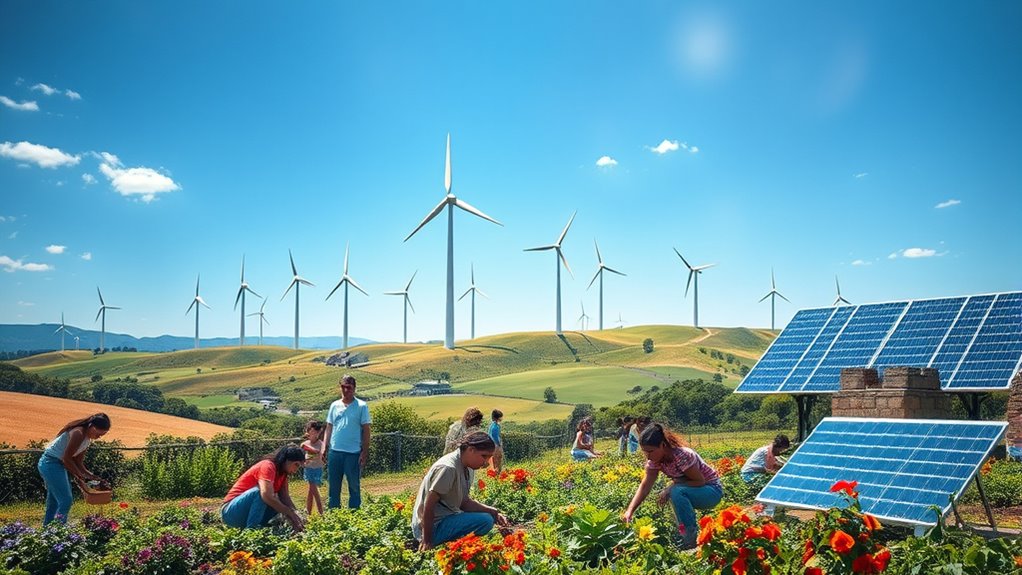
As countries around the globe strive for a sustainable future, numerous key initiatives illustrate their commitment to renewable energy and environmental stewardship.
In Abu Dhabi, Masdar City aims for carbon neutrality, utilizing solar, wind, and geothermal energy. This initiative reflects the growing trend toward renewable energy sources, which are essential for reducing carbon footprints. Additionally, advanced directives in sustainability planning can help ensure that future generations benefit from these initiatives. The focus on sustainable practices in urban development is crucial for minimizing environmental impacts.
Vermont’s Green Mountain Power Wind Farm provides electricity to over 60,000 homes, with turbines designed to minimize noise pollution.
Norway leads in renewable energy, generating about 95% of its power from hydropower.
New Zealand invests in eco-friendly technologies to support its Zero Carbon Act.
Meanwhile, Suzhou Industrial Park in China focuses on energy efficiency and high-tech industries, promoting sustainable practices worldwide.
These initiatives showcase how nations are actively working toward a greener, more sustainable planet.
The Benefits of Adopting Sustainable Practices
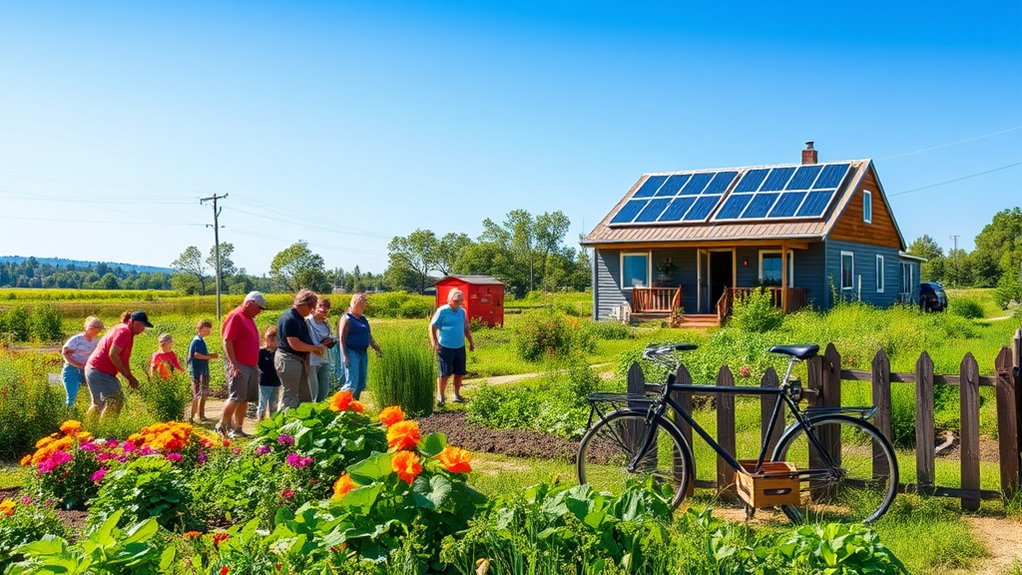
Adopting sustainable practices not only benefits the environment but also enhances your health and well-being. By reducing air pollution, you improve air quality, which is vital for respiratory health. Lowering greenhouse gas emissions helps combat climate change, while conserving natural resources supports a sustainable future. Additionally, reducing exposure to toxins in your home can lead to a healthier living environment and lower the risk of health problems. Engaging in mindfulness techniques can further boost your mental health, and choosing sustainable food options, such as those rich in omega-3 fatty acids, promotes better nutrition. Incorporating leafy greens into your diet can also help improve cognitive performance and overall health. Economically, you’ll save money by reducing waste and energy consumption, while fostering community bonds enhances social well-being.
How You Can Contribute to Sustainability Efforts
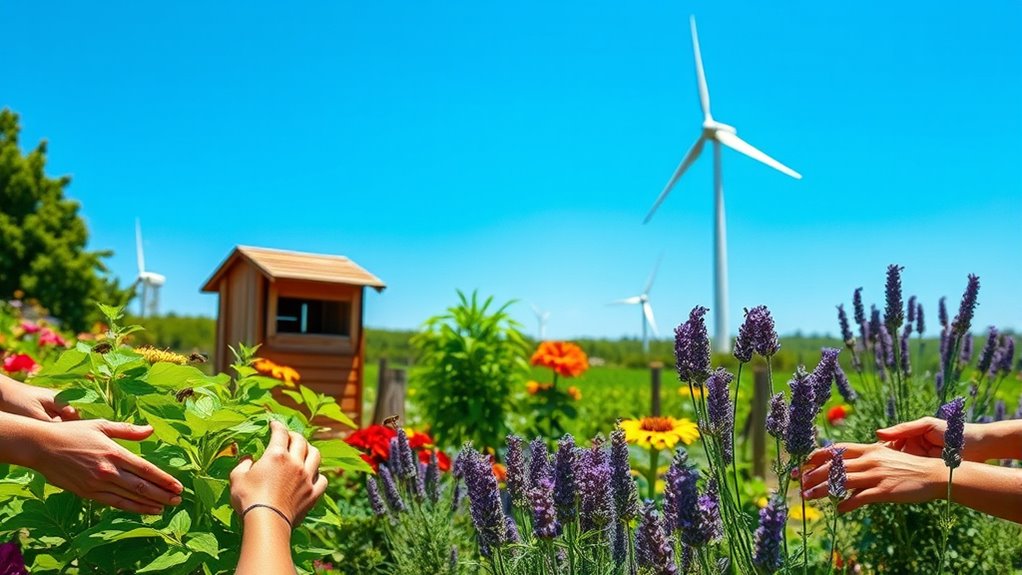
While many people think sustainability is a collective effort, individual actions play a crucial role in making a difference.
You can start by choosing eco-friendly products and adopting a plant-based diet, which lowers your environmental impact. Additionally, incorporating juice cleansing into your routine can promote health while encouraging the consumption of plant-based ingredients. Use public transport, walk, or cycle to reduce carbon emissions, and avoid single-use plastics by opting for reusable alternatives. Consider improving your home’s energy efficiency by investing in a high-performance heat pump that can significantly reduce energy consumption. Heat pumps can achieve efficiencies of 300-600%, making them a highly effective option for home heating and cooling.
Improve your home’s energy efficiency with energy-saving appliances and conserve water with low-flow fixtures. Support local farmers by purchasing locally sourced produce and consider growing your own fruits and vegetables.
Get involved in community sustainability initiatives, advocate for environmentally friendly policies, and participate in volunteer programs.
Every small action counts, and by making these changes, you contribute meaningfully to sustainability efforts.
Frequently Asked Questions
How Can Individuals Measure Their Carbon Footprint Effectively?
Imagine stepping on a scale that not only shows your weight but also reveals how your daily choices impact the planet.
To measure your carbon footprint effectively, you can use online tools like the EPA’s calculator, which tracks your activities and expenses.
By categorizing your spending, you’ll see which habits contribute most to emissions.
This awareness helps you make informed choices, leading to meaningful reductions in your environmental impact.
What Are Common Misconceptions About Sustainability?
You might think sustainability is only about the environment, but it’s really a mix of social and economic factors too.
Many people believe recycling alone is enough, but it’s just one piece of the puzzle.
You may also feel that sustainability’s too expensive or time-consuming, but initial costs can lead to savings, and small changes are manageable.
How Does Sustainability Relate to Climate Change?
Imagine planting a tree today that’ll provide shade for future generations.
That’s how sustainability relates to climate change. It’s about making choices now that protect our planet and its people later.
By adopting sustainable practices, you’re reducing carbon emissions and helping to preserve biodiversity.
Every small action you take supports broader climate goals, ensuring a healthier Earth.
What Role Do Businesses Play in Sustainability?
Businesses play a crucial role in sustainability by driving economic growth and innovation.
You’ll see them adopting green practices like energy-efficient technologies and sustainable sourcing, which help reduce waste and conserve resources.
By investing in renewable energy and collaborating with governments and NGOs, they support social and environmental initiatives.
When you choose to support these businesses, you’re not just shopping; you’re actively participating in a movement toward a more sustainable future.
Are There Certifications for Sustainable Products?
Yes, there are numerous certifications for sustainable products that you can look for.
For instance, the Global Organic Textile Standard (GOTS) ensures textiles meet environmental and social criteria. Fairtrade Certification promotes fair labor practices, while the Forest Stewardship Council (FSC) guarantees responsible forestry.
You might also consider the Rainforest Alliance Certification for sustainable agriculture.
These certifications help you make informed choices, supporting products that align with your values for a sustainable future.
Conclusion
In a world where every choice ripples through time, embracing sustainability isn’t just a trend—it’s a lifeline. By nurturing the planet, promoting fairness, and balancing prosperity, you become a vital thread in the fabric of a greener future. Every small action, from reducing waste to supporting local businesses, adds color to this vibrant tapestry of change. So, let’s sow the seeds of sustainability together, cultivating a flourishing world for generations to come. Your journey starts today!
